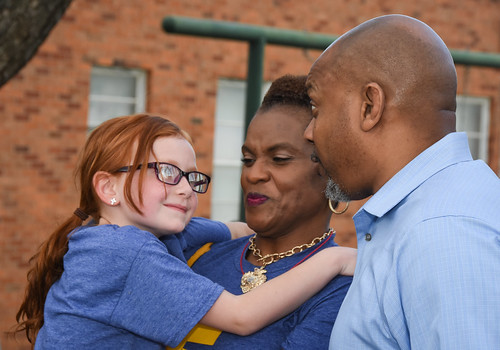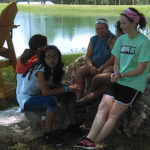CISCO—The last time First Baptist Church in Cisco found itself without a pastor, the search committee steered down a road rarely traveled.
Literally, they turned toward Abilene, 48 miles west on Interstate 20, one of the busiest highways in Texas. But in every other respect, they charted a new course for their 138-year-old congregation.
First Baptist, an almost all-white church in an almost all-white farming/ranching/fracking community, called Kelvin Kelley, a black minister/professor/nonprofit entrepreneur, to be its pastor.
When the church’s previous pastor, Craig Curry, left in 2009, pastor-search committee member Delburt Schaeffer asked about recommendations for preachers to fill the pulpit and serve as interim pastor.
“Craig already made the list,” Shaeffer recalled. “He handed it to me and said, ‘The best one is the first one on the list.’ … Dr. Kelley was at the top.”
 Dr. Kelvin Kelley, pastor of First Baptist Church Cisco (Photo / David Jones)Kelley preached in November, and the committee asked him to become interim pastor. He said no. Not because he wasn’t interested, but because he was too busy.
Dr. Kelvin Kelley, pastor of First Baptist Church Cisco (Photo / David Jones)Kelley preached in November, and the committee asked him to become interim pastor. He said no. Not because he wasn’t interested, but because he was too busy.
Kelley taught courses on leadership, Christian education and spiritual formation as a faculty member at Hardin-Simmons University’s Logsdon School of Theology. He also operated FACES—First A Challenge Eventually Success—a ministry to bridge the gap of absentee or disconnected fatherhood for high school and college young men.
Three months later, Kelley became First Baptist’s interim pastor. Three months after that, the search committee told him, “We think you may be the guy,” he remembered. “I said: ‘No way. I can’t add this.’ They said, ‘We’re not listening to anybody else.’”
“People in our church were going to everybody on the committee, saying: ‘Why are you looking? We want this guy,’” Shaeffer said.
Sign up for our weekly edition and get all our headlines in your inbox on Thursdays
The committee acknowledged the significance of an Anglo congregation calling an African-American pastor. “We want to do church unusual,” they told Kelley. They suggested he serve bivocationally—continuing to live in Abilene and teach at Hardin-Simmons.
During a month of prayer, Kelley dreamed about the Apostle Peter’s vision of all kinds of animals lowered from heaven. He interpreted the dream as telling him what Peter heard from God: “Men are looking for you; don’t be afraid to go with them.” Meanwhile, his wife, Kimberly, told him, “I sense it’s time to begin a new chapter.”
So, the search committee recommended Kelley to the church, and 94 percent of the voting members confirmed the call.
Kelley stepped to the pulpit and told them: “Today, we begin. … We’re not going to act like this is normal. We will not stick our heads in the sand; we will not be naïve. There is no precedent for us to follow, and we’ll make mistakes. But we will do things face-to-face.”
James Shields, Kelley’s mentor, longtime religion professor at both Hardin-Simmons and Howard Payne University and twice an interim at First Baptist, told him: “Brother Kelley, I don’t know if I’m more proud of them or you. I remember a time when you would not have been welcome in that church,” Kelley recalled.
They lost three families, but pastor and congregation “have been navigating in that (history-confounding) reality ever since,” Kelley said.
 Pastor Kelvin Kelley finds joy in spending time with the children at First Baptist Church in Cisco. (Photo / David Jones)First Baptist’s demographics mirror its community’s—about 95 percent Anglo, 3 percent Hispanic and 1 percent or 2 percent African-American. In addition to the Kelley family, one young woman and the husband of an Anglo wife are the church’s only African-Americans, and one Hispanic woman married to an Anglo man is a member.
Pastor Kelvin Kelley finds joy in spending time with the children at First Baptist Church in Cisco. (Photo / David Jones)First Baptist’s demographics mirror its community’s—about 95 percent Anglo, 3 percent Hispanic and 1 percent or 2 percent African-American. In addition to the Kelley family, one young woman and the husband of an Anglo wife are the church’s only African-Americans, and one Hispanic woman married to an Anglo man is a member.
“Every time Kimberly and I make a house call, to cross that threshold, we make history,” he said. “And then, to go on a hospital visit and hear a Caucasian man, about 70 years old, say, ‘I love you’ to me—in front of his wife.”
The church’s walk alongside its pastor has required courage and faith, Kelley noted. “They did not let the social dynamics … what their friends said about them having a black pastor, making them the butt of jokes … dictate what God was doing in the ‘church unusual.’”
When people think about the differences in African-American and Anglo churches, they often focus on worship. But Kelley credits his experiences at Hardin-Simmons for helping him bridge that chasm. Professors Jim Heflin and Ronnie Prevost showed him “how people of the dominant culture hear the word of God,” he explained. “I learned how to preach and be relevant by learning how they hear the proclamation.”
And as a Logsdon faculty member, Kelley already had preached to all-white congregations in small towns such as Bangs, Brady and Comanche.
First Baptist and Kelley also figured out how to accept each other, even in their differences. “I tell them, ‘I want you to be who you are, and you to let me be who I am,’” he said.
Race aside, some of the challenges Kelley and First Baptist have navigated—such as balancing contemporary and traditional worship, deciding what kind of dress is appropriate and determining the role of deacons—are common to all kinds of churches.
Five years into the pastorate, the Kelleys decided to move from Abilene into the church parsonage in Cisco. Now, he commutes to Hardin-Simmons for classes, but they live on the church field.
 Dr. Kelley with his wife Kimberly, FBC Cisco member Sharon Sellers, and his granddaughter Anna (Photo / David Jones)Before the move, they consulted their children. Kelvin Lamar, a sophomore at Abilene Christian University, admitted the move wouldn’t make much difference for him. Anna, a second-grader, didn’t have a lot at stake. But it posed a major life change for K.J., a 10th-grader who grew up wanting to play football for Cooper High School in Abilene. He faced the challenge with faith. “If that’s what God is doing, then that’s what we need to do,” he told his parents.
Dr. Kelley with his wife Kimberly, FBC Cisco member Sharon Sellers, and his granddaughter Anna (Photo / David Jones)Before the move, they consulted their children. Kelvin Lamar, a sophomore at Abilene Christian University, admitted the move wouldn’t make much difference for him. Anna, a second-grader, didn’t have a lot at stake. But it posed a major life change for K.J., a 10th-grader who grew up wanting to play football for Cooper High School in Abilene. He faced the challenge with faith. “If that’s what God is doing, then that’s what we need to do,” he told his parents.
So, they made the move and journeyed further down the path rarely taken.
“The church didn’t ask us to do it, … but people have to know you care about them,” Kelley said.
That feeling is mutual, church members reported.
“The people have accepted him really well,” said Lavada Starr, the church’s secretary and receptionist. “He’s easy to work with … God living in our hearts makes it work.”
“First Baptist has always been all-inclusive,” noted Brad Kimbrough, a member 42 years. “When I joined, we had taken in people from a Mexican mission. We had Hispanics in the church. We had a black deacon at the time. … I would say we’re not liberal; we’re very conservative. But it’s always been a church where everyone is welcome.”
Kelley wants to keep it that way. “Love is the greatest gift the world has known,” he said. “I love my people, and they love me, and we want you to see the difference love makes.”
Read more articles like this in CommonCall: The Baptist Standard magazine. CommonCall features inspiring stories about Christians living out their faith. An annual subscription is only $24 and comes with two complementary subscriptions to the Baptist Standard. Click here to subscribe.















We seek to connect God’s story and God’s people around the world. To learn more about God’s story, click here.
Send comments and feedback to Eric Black, our editor. For comments to be published, please specify “letter to the editor.” Maximum length for publication is 300 words.